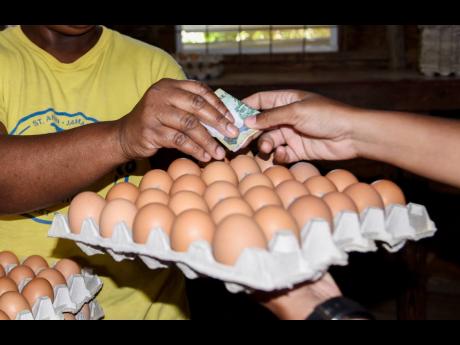Egg farmers crack under strain – JAS
But industry lobbyist assures sufficient supply for Christmas with modest price increase
Local egg farmers are struggling to ramp up production to satisfy the traditional pre-Christmas surge in demand as stakeholders emerge from the shadows of the COVID-19 economy, Jamaica Agricultural Society (JAS) President Lenworth Fulton has said....
Local egg farmers are struggling to ramp up production to satisfy the traditional pre-Christmas surge in demand as stakeholders emerge from the shadows of the COVID-19 economy, Jamaica Agricultural Society (JAS) President Lenworth Fulton has said.
Citing long-standing industry concerns, Fulton said that the December spike –largely stimulated by the baking industry – has put a strain on farmers whose operations have, in some cases, been scaled back as a result of the pandemic.
Fulton said it was unsustainable to significantly expand operations to capitalise on a two-month spike.
“The egg farmers cannot expand their businesses to suit Christmas alone if you know the egg business. You would have to grow layers, and you would have to have them for, like, a year and six months laying for you to make a profit,” Fulton said in a Gleaner interview Sunday.
The JAS president warned that the burgeoning Christmas demand would likely lead to the importation of liquid eggs to fill peak-season deficits as producers were often unable to meet orders throughout the year.
“We have been trying over the years to educate our people to use more eggs, which would give the egg farmers a bigger market, because we are one of the lowest egg-eating countries per capita,” Fulton said.
But Ronald Ranger, an executive member of the Jamaica Egg Farmers Association, disagrees with the doomsday prediction.
Ranger contends that farmers have been largely self-sufficient for the past 10 years in egg and poultry production.
He countered Fulton’s concerns, arguing that there had not been a significant drop in production and that consumers would have their needs met.
“Every month we have a meeting and we do stock taking, so to speak, like, check up how many eggs are in circulation, how many are on the farms, how many are in stock … so we know where we are at,” he said.
Ranger noted, however, that a price increase was expected.
“Apart from the high costs of inputs that we have been having over the past year … there wasn’t any great demand for the eggs during the year. What happens is that when the demand comes in at Christmas, farmers tend to put their prices up to try and recover some of the losses that they incurred during the year,” he said.
Farmers generally sell eggs for $1,000 or less per flat - a tray of 30 eggs - during Christmas.
“Once you not getting it from the farmer or, like, the supermarkets or wholesalers who buy from the farmers, they (consumers) shouldn’t be having any large wholesale increases, maybe a 10 per cent or so, but I don’t think anything drastically above that will be happening,” he said.
A case of eggs (consisting of 12 trays) is being sold for between $10,000 and $12,000, said Ranger.

